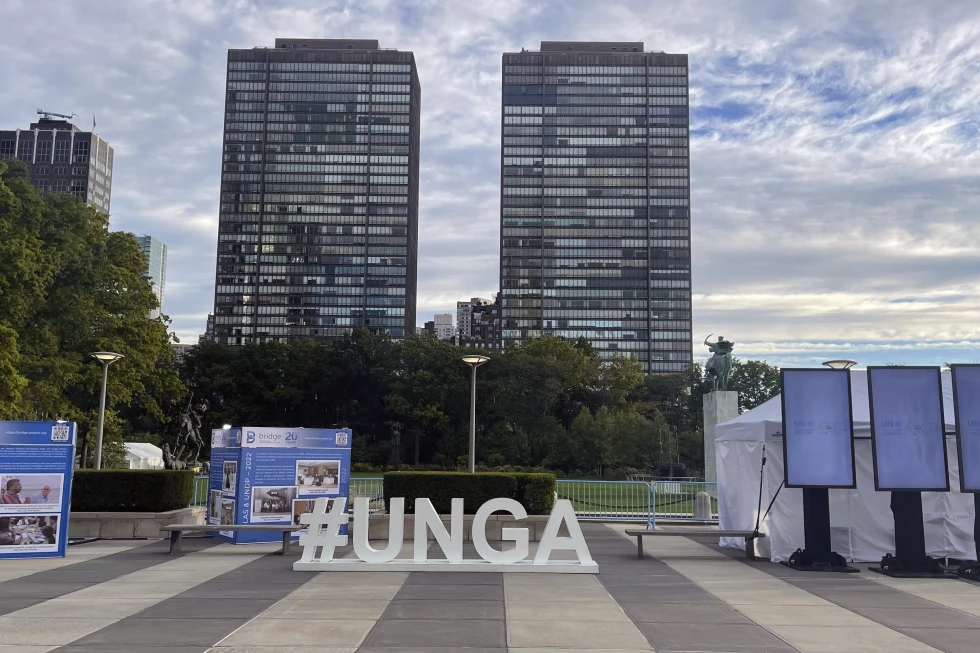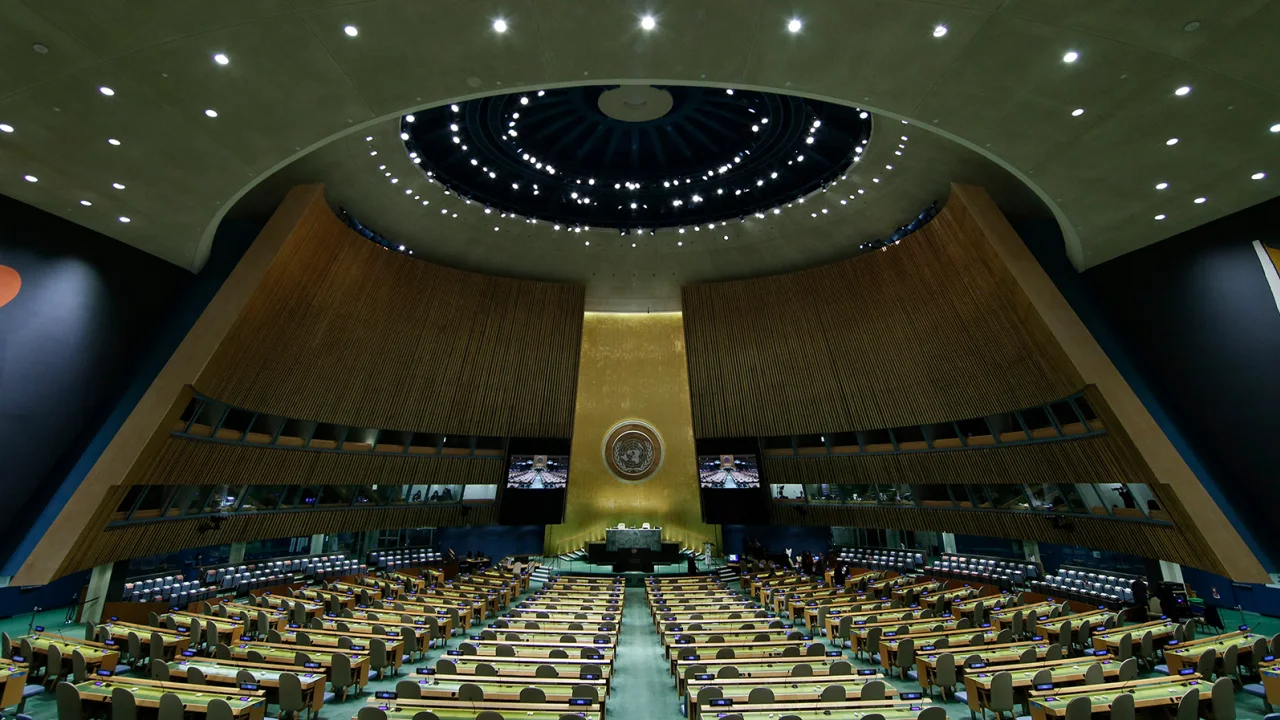Meeting Of World Leaders At 78th UN General Assembly
As the meeting of world leaders at 78th UN General Assembly begins, the world faces a multitude of challenges, with no single crisis set to dominate the General Debate.
Author:Suleman ShahReviewer:Han JuSep 19, 202321K Shares412.4K Views

As the meeting of world leaders at 78th UN General Assemblybegins, the world faces a multitude of challenges, with no single crisis set to dominate the General Debate.
From the shadow of Russia's war in Ukraine to the ongoing coronavirus pandemic, the perils of climate change, poverty, and inequality persist.
Rebuilding Trust And Global Solidarity
The theme for this year's General Debate is "Rebuilding trust and reigniting global solidarity: Accelerating action on the 2030 Agenda and its Sustainable Development Goals towards peace, prosperity, progress, and sustainability for all."
This theme underscores the need for collective action to address pressing global issues and promote sustainable development.
While the effectiveness of the United Nations has been debated over the years, the UNGA remains a critical platform for countries to voice their concerns, agendas, and calls to action.
“„The week is an opportunity for smaller countries for the world to lay out their priorities in front of us. I don’t see the week as being a competition between big powers.- US Ambassador Linda Thomas-Greenfield
It was established in the aftermath of World War II with the aim of maintaining peace and fostering international cooperation.
Key Participants
Heads of state and government from at least 145 countries are expected to address the General Assembly. Notable leaders include:
- Brazilian President Luiz Inácio Lula da Silva
- U.S. President Joe Biden
- Ukrainian President Volodymyr Zelenskyy
Zelenskyy's in-person appearance at the U.N. holds special significance, given the ongoing conflict in Ukraine and his previous prerecorded speech to the General Assembly.
Several key leaders will not attend in person, including the leaders of the permanent U.N. Security Council members—France, the United Kingdom, China, and Russia.
While the presence of Vladimir Putin was unlikely, the absence of Emmanuel Macron and British Prime Minister Rishi Sunak is notable.
The Structure Of The General Debate
The UNGA General Debate differs from presidential debates, as it does not permit disruptions, booing, or immediate rebuttals.
However, the speeches are rich in content and subtext, often containing evocative language, barbs, and veiled messages. Speeches are expected to run for 15 minutes, but many exceed this limit.
Member states have the right of reply, allowing them to rebut criticism voiced during the General Debate. While these exchanges can be fiery, they are typically delivered by lower-level members of a country's delegation.
This year's General Debate concludes a day later than usual, on Tuesday, September 26. This schedule change is due to the observance of the Jewish holiday of Yom Kippur, during which no speeches will be delivered.
Traditionally, Brazil takes the lead as the first country to speak, followed by the United States. The order of subsequent speakers is determined by various factors, including the rank of the delegate and geographical balance.
The U.N. General Assembly is not limited to member states; permanent observers also have access to meetings and relevant documentation.
Complex Global Issues
The UNGA takes place against a backdrop of complex global issues, including Russia's war in Ukraine, political crises in Africa and Latin America, the ongoing COVID-19 pandemic, economic instability, inequality, and natural disasters such as earthquakes, floods, and fires.
While the UNGA offers a platform for diplomatic discourse, global disputes and rivalries between major powers could hinder progress on critical issues. Maintaining a focus on human rights amid the political discussions remains a challenge.
Final Words
The 78th U.N. General Assembly opens at a time when the world faces an array of interconnected challenges.
It serves as an opportunity for leaders to address these issues collectively and to seek solutions that promote peace, prosperity, and sustainability for all.
However, the path forward remains complex, and the impact of this year's UNGA on global affairs remains to be seen.

Suleman Shah
Author
Suleman Shah is a researcher and freelance writer. As a researcher, he has worked with MNS University of Agriculture, Multan (Pakistan) and Texas A & M University (USA). He regularly writes science articles and blogs for science news website immersse.com and open access publishers OA Publishing London and Scientific Times. He loves to keep himself updated on scientific developments and convert these developments into everyday language to update the readers about the developments in the scientific era. His primary research focus is Plant sciences, and he contributed to this field by publishing his research in scientific journals and presenting his work at many Conferences.
Shah graduated from the University of Agriculture Faisalabad (Pakistan) and started his professional carrier with Jaffer Agro Services and later with the Agriculture Department of the Government of Pakistan. His research interest compelled and attracted him to proceed with his carrier in Plant sciences research. So, he started his Ph.D. in Soil Science at MNS University of Agriculture Multan (Pakistan). Later, he started working as a visiting scholar with Texas A&M University (USA).
Shah’s experience with big Open Excess publishers like Springers, Frontiers, MDPI, etc., testified to his belief in Open Access as a barrier-removing mechanism between researchers and the readers of their research. Shah believes that Open Access is revolutionizing the publication process and benefitting research in all fields.

Han Ju
Reviewer
Hello! I'm Han Ju, the heart behind World Wide Journals. My life is a unique tapestry woven from the threads of news, spirituality, and science, enriched by melodies from my guitar. Raised amidst tales of the ancient and the arcane, I developed a keen eye for the stories that truly matter. Through my work, I seek to bridge the seen with the unseen, marrying the rigor of science with the depth of spirituality.
Each article at World Wide Journals is a piece of this ongoing quest, blending analysis with personal reflection. Whether exploring quantum frontiers or strumming chords under the stars, my aim is to inspire and provoke thought, inviting you into a world where every discovery is a note in the grand symphony of existence.
Welcome aboard this journey of insight and exploration, where curiosity leads and music guides.
Latest Articles
Popular Articles
